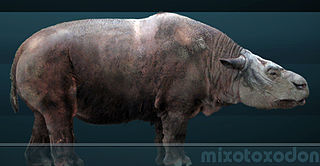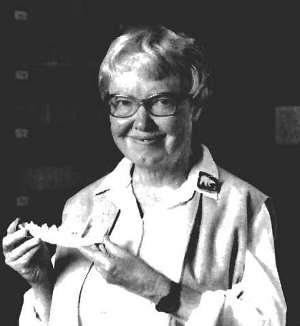Related Research Articles

The Society of Vertebrate Paleontology (SVP) is a professional organization that was founded in the United States in 1940 to advance the science of vertebrate paleontology around the world.

Iron Cove is a bay on the Parramatta River, in the inner-west of Sydney, in the state of New South Wales, Australia. It is approximately 5 kilometres (3.1 mi) due west of Sydney's central business district. It is surrounded by the suburbs of Birchgrove, Balmain, Rozelle, Lilyfield, Haberfield, Five Dock, Rodd Point, Russell Lea and Drummoyne. The bay extends from Longnose Point to the south-west and is fed by the Hawthorne Canal and the Iron Cove Creek.
The Jackson School of Geosciences at The University of Texas at Austin unites the Department of Geological Sciences with two research units, the Institute for Geophysics and the Bureau of Economic Geology.
Wann Langston Jr. was an American paleontologist and professor at the University of Texas at Austin.

Digital Morphology (DigiMorph), part of the National Science Foundation Digital Libraries Initiative, creates and shares 2D and 3D visualizations of the internal and external structure of living and extinct vertebrates, and a growing number of 'invertebrates.'

Toxodontidae is an extinct family of notoungulate mammals, known from the Oligocene to the Holocene of South America, with one genus, Mixotoxodon, also known from the Pleistocene of Central America and southern North America. Member of the family were medium to large-sized, and had medium to high-crowned dentition, which in derived members of the group evolved into ever-growing cheek teeth. Isotopic analyses have led to the conclusion that Pleistocene members of the family were flexible mixed feeders.

Malcolm Carnegie McKenna (1930–2008) was an American paleontologist and author on the subject.

Tremarctos floridanus, occasionally called the Florida spectacled bear, Florida cave bear, or rarely Florida short-faced bear, is an extinct species of bear in the family Ursidae, subfamily Tremarctinae. T. floridanus was widespread in the Southeastern United States during the Rancholabrean epoch, with scattered reports of fossils from other parts of North America and from earlier epochs.

Mixotoxodon is an extinct genus of notoungulate of the family Toxodontidae inhabiting South America, Central America and parts of southern North America during the Pleistocene epoch, from 1,800,000—12,000 years ago.

Elaine Anderson was an American paleontologist. She is best known for her work on vertebrate paleontology.
Sharon Mosher is an American geologist. She did her undergraduate work at University of Illinois Urbana-Champaign. After earning an MSc from Brown University, she returned to the University of Illinois to get her PhD in Geology in 1978. Since 2001 she has held the William Stamps Farish Chair at University of Texas, and, since 2009 she has served as the dean of the Jackson School of Geosciences at Texas. In 2013 she became the president of the American Geosciences Institute.

Mrinal Kanti Sen, an Indian-American geophysicist is the John A. and Katherine G. Jackson Chair in Applied Seismology at the Jackson School of Geosciences of the University of Texas at Austin. He holds joint appointment with the Institute for Geophysics (UTIG) and the Department of Geological sciences (DGS). Since 2016, he has been serving as the head of the energy research division at UTIG. He has been a pioneer in the field Seismic Wave Propagation and Inverse Theory applied to Geophysical Problems. He has published more than 180 papers, and two books, and supervised over 50 graduate students. As an author, he is widely held in libraries worldwide. He was recognized by the Society of Exploration Geophysicists in 2015 for pioneering development and application of global optimization methods in geophysical inversion.
Rong Fu is a Chinese-American climatologist, meteorologist, researcher, professor, and published author with more than 100 articles, books, and projects detailing changes that occur in Earth's atmosphere and how they affect climate, seasons, rainfall, and the like. Fu has been invited to present over 115 presentations and seminars, and has administered more than 32 projects that received over 11 million dollars in funding. The focus areas of Fu's research are convection; cloud and precipitation processes and their role in climate; atmospheric transport in the upper troposphere and lower stratosphere; the interaction between the atmosphere and ocean and terrestrial vegetation; satellite remote sensing applications and retrievals; the interaction between rainfall rates and the rainforest in regions of the Amazon rainforest; and drought prediction in states across the United States, including California and Texas. She is currently a professor in the Atmospheric and Oceanic Sciences Department at UCLA and the associate director of UCLA's Joint Institute for Regional Earth System Science and Engineering. She is also an adjunct professor in the Jackson School of Geosciences at the University of Texas at Austin.

Christopher Aiden-Lee Jackson is a British geoscientist, science communicator and Director of Sustainable Geoscience at Jacobs Engineering Group. He was previously Professor of Sustainable Geoscience at the University of Manchester, and before that held the Equinor Chair of Basin Analysis at Imperial College, London. He is known for his work in geoscience, especially in the use of 3D seismic data to understand dynamic processes in sedimentary basins.
Paul David Polly is an American paleontologist and the Robert R. Shrock Professor in the Department of Earth and Atmospheric Sciences at Indiana University as well as the sitting chair of the department.

Julia Allison Clarke is an American paleontologist and evolutionary biologist who studies the evolution of birds and the dinosaurs most closely related to living birds. She is the John A. Wilson Professor in Vertebrate Paleontology in the Jackson School of Geosciences and a Howard Hughes Medical Institute Professor at the University of Texas at Austin.
Celina A. Suarez is an American geologist. She is known for her research on using trace element and stable isotope geochemistry of fossil vertebrates and invertebrates to understand paleoecology, paleoclimatology, and taphonomy of ancient terrestrial ecosystems. She is an associate profession in the Department of Geosciences at the University of Arkansas. The dinosaur Geminiraptor suarezarum is named after Suarez and her twin sister, Marnia Suarez, co-discovers of the site on which it was found.
Claudia Mora is the dean of the Jackson School of Geosciences at the University of Texas at Austin and the John A. and Katherine G. Jackson Decanal Chair in the Geosciences.
Headwig Thusnelda Kniker (1891-1985) was an American geologist and micropaleontologist. Kniker, alongside fellow female geologists Alva Ellisor and Esther Applin, changed the landscape of oil well drilling in the United States through the use of foraminiferal micropaleontology.
References
- ↑ "Researcher Profile: E L Lundelius". Jackson School of Geosciences. The University of Texas at Austin. Retrieved 9 August 2019.